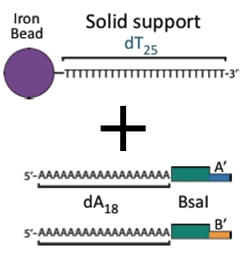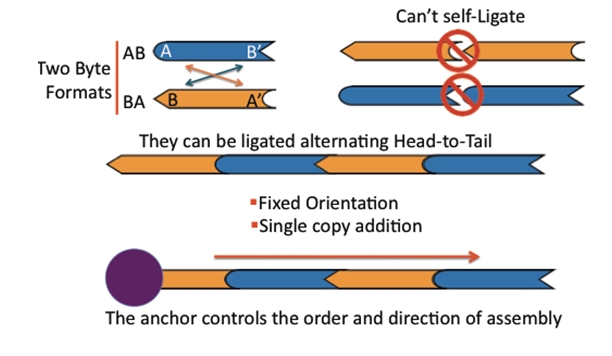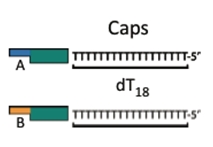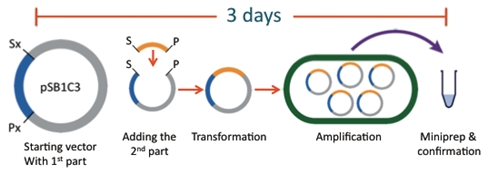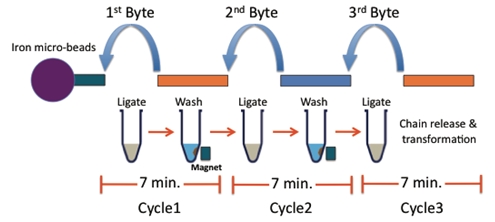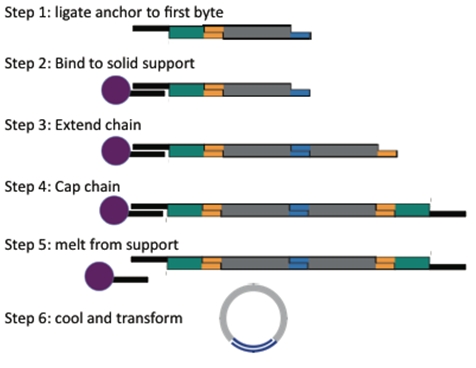Team:Alberta/Tour/biobytes
From 2010.igem.org
| Line 14: | Line 14: | ||
[[Image:team-alberta-anchor-tour.jpg|float=left]] | [[Image:team-alberta-anchor-tour.jpg|float=left]] | ||
| - | + | <div class="tour-info"> | |
==The Anchor== | ==The Anchor== | ||
A ferro-magnetic bead attached to a piece of DNA. This piece serves as the initial piece from which we assemble a DNA construct. The bead allows us to manipulate the DNA with magnets making washing and subsequent attachments easier. | A ferro-magnetic bead attached to a piece of DNA. This piece serves as the initial piece from which we assemble a DNA construct. The bead allows us to manipulate the DNA with magnets making washing and subsequent attachments easier. | ||
| - | + | </div> | |
| + | <div class="tour-info"> | ||
[[Image:team-alberta-bytes-tour.jpg|float=left]] | [[Image:team-alberta-bytes-tour.jpg|float=left]] | ||
| - | |||
==The bytes== | ==The bytes== | ||
DNA fragments that can be attached together to build up a larger construct. There are two types of pieces, AB and BA. The A end can join only with another A end and the B end can join only with another B end. As a result pieces can only be joined in a single orientation. | DNA fragments that can be attached together to build up a larger construct. There are two types of pieces, AB and BA. The A end can join only with another A end and the B end can join only with another B end. As a result pieces can only be joined in a single orientation. | ||
| - | + | </div> | |
| + | <div class="tour-info"> | ||
[[Image:team-alberta-cap-tour.jpg|float=left]] | [[Image:team-alberta-cap-tour.jpg|float=left]] | ||
| Line 28: | Line 29: | ||
==The cap== | ==The cap== | ||
A DNA fragment that finishes off a construct and allows for circularization of the construct into a plasmid. | A DNA fragment that finishes off a construct and allows for circularization of the construct into a plasmid. | ||
| - | + | </div> | |
| - | + | <div class="tour-info"> | |
| + | [[Image:team-alberta-biobrick-tour.jpg]] | ||
| + | [[Image:team-alberta-building-tour.jpg]] | ||
| + | The process of building a plasmid is more elegant and more rapid than the current biobyte system! | ||
| + | </div> | ||
| + | <div class="tour-info"> | ||
[[Image:team-alberta-biobyteprocess-tour.jpg]] | [[Image:team-alberta-biobyteprocess-tour.jpg]] | ||
| - | |||
| - | |||
| - | |||
| - | |||
| - | |||
| - | |||
| - | |||
Starting with an anchor, add the first piece and ligate. | Starting with an anchor, add the first piece and ligate. | ||
| Line 52: | Line 51: | ||
Using this process we were able to assemble eight pieces in an afternoon! | Using this process we were able to assemble eight pieces in an afternoon! | ||
| + | </div> | ||
{{Team:Alberta/endMainContent|class=not-top}} | {{Team:Alberta/endMainContent|class=not-top}} | ||
Revision as of 04:15, 26 October 2010
The Anchor
A ferro-magnetic bead attached to a piece of DNA. This piece serves as the initial piece from which we assemble a DNA construct. The bead allows us to manipulate the DNA with magnets making washing and subsequent attachments easier.
The bytes
DNA fragments that can be attached together to build up a larger construct. There are two types of pieces, AB and BA. The A end can join only with another A end and the B end can join only with another B end. As a result pieces can only be joined in a single orientation.
The cap
A DNA fragment that finishes off a construct and allows for circularization of the construct into a plasmid.
Starting with an anchor, add the first piece and ligate.
Then hold the single piece construct in the tube by placing it on the magnetic rack. Now you can wash away most of the excess of piece 1.
Add the next piece and repeat until you have added all the pieces you want.
Then add the cap.
Now just heat to release the anchor and open up the cap, upon cooling the construct will circularize.
Easy!
Using this process we were able to assemble eight pieces in an afternoon!
 "
"

